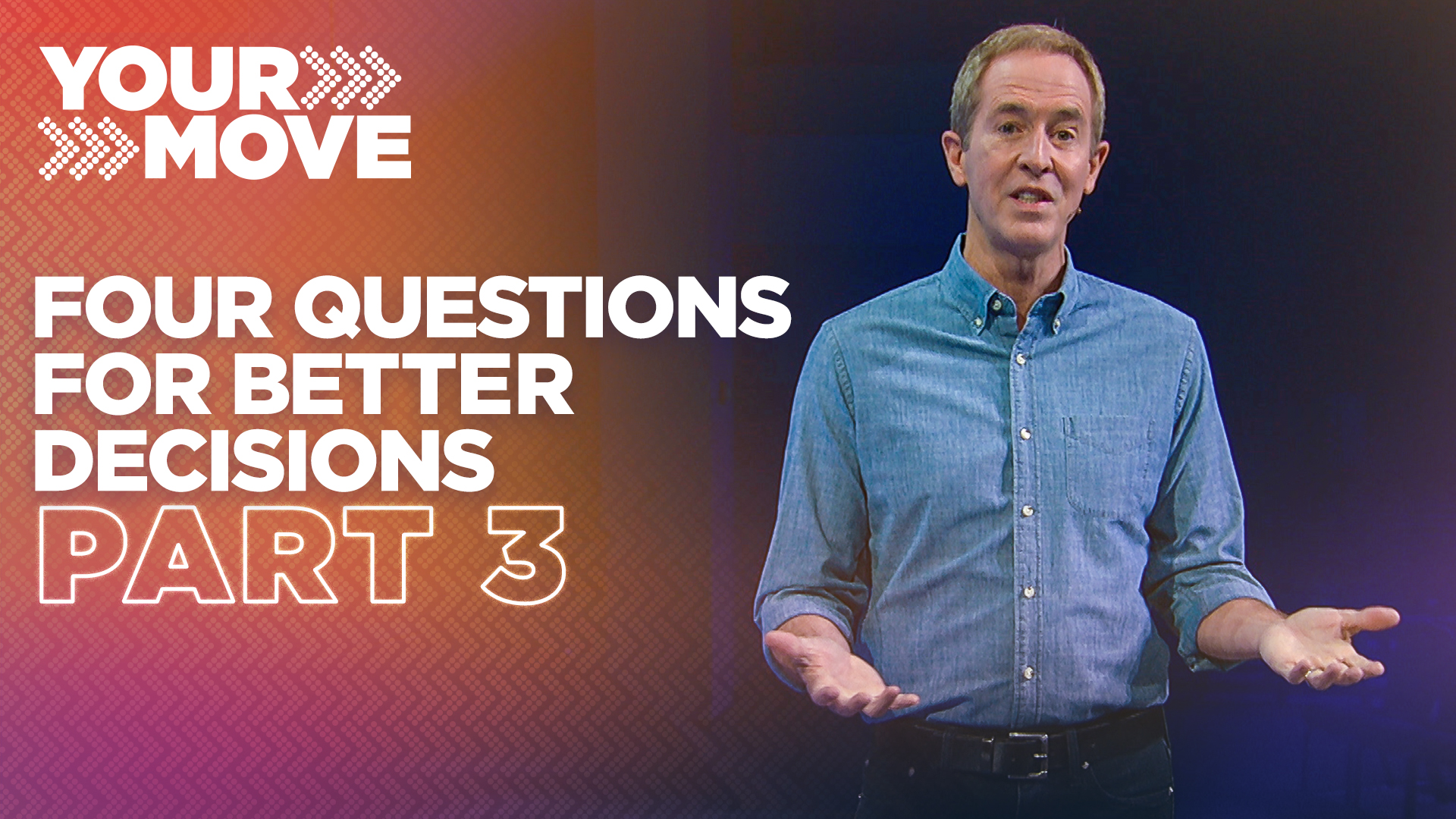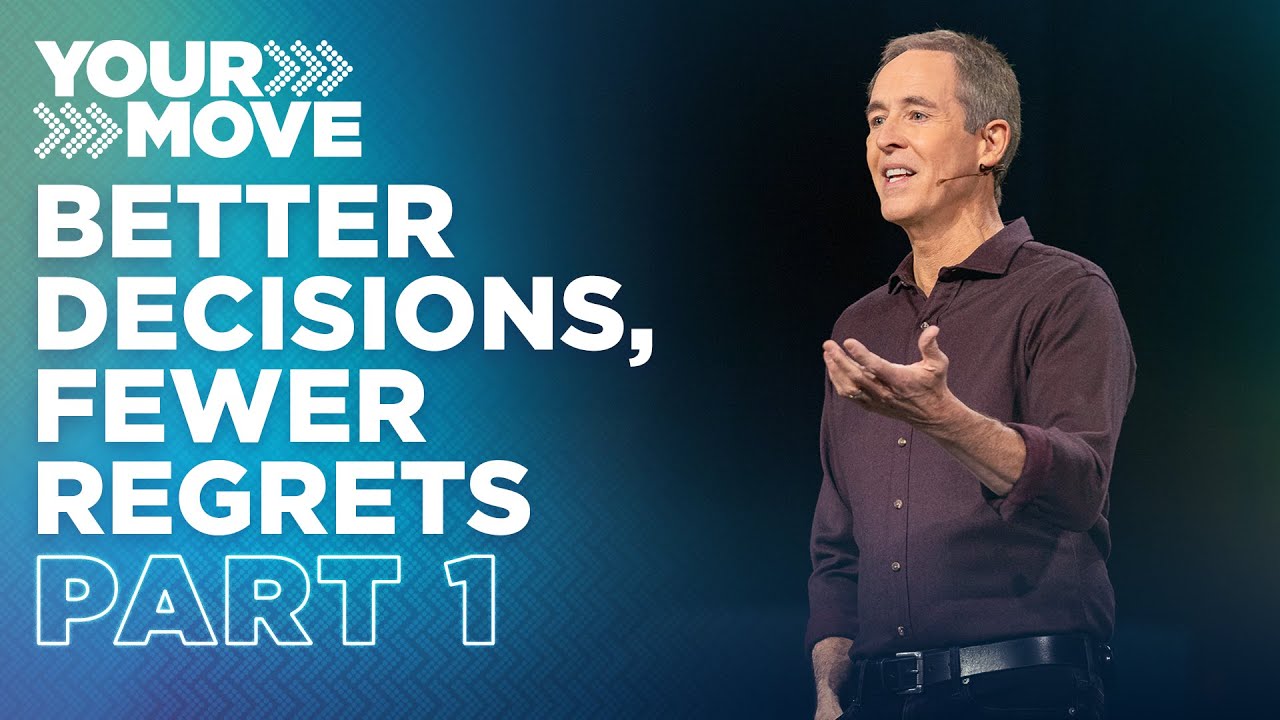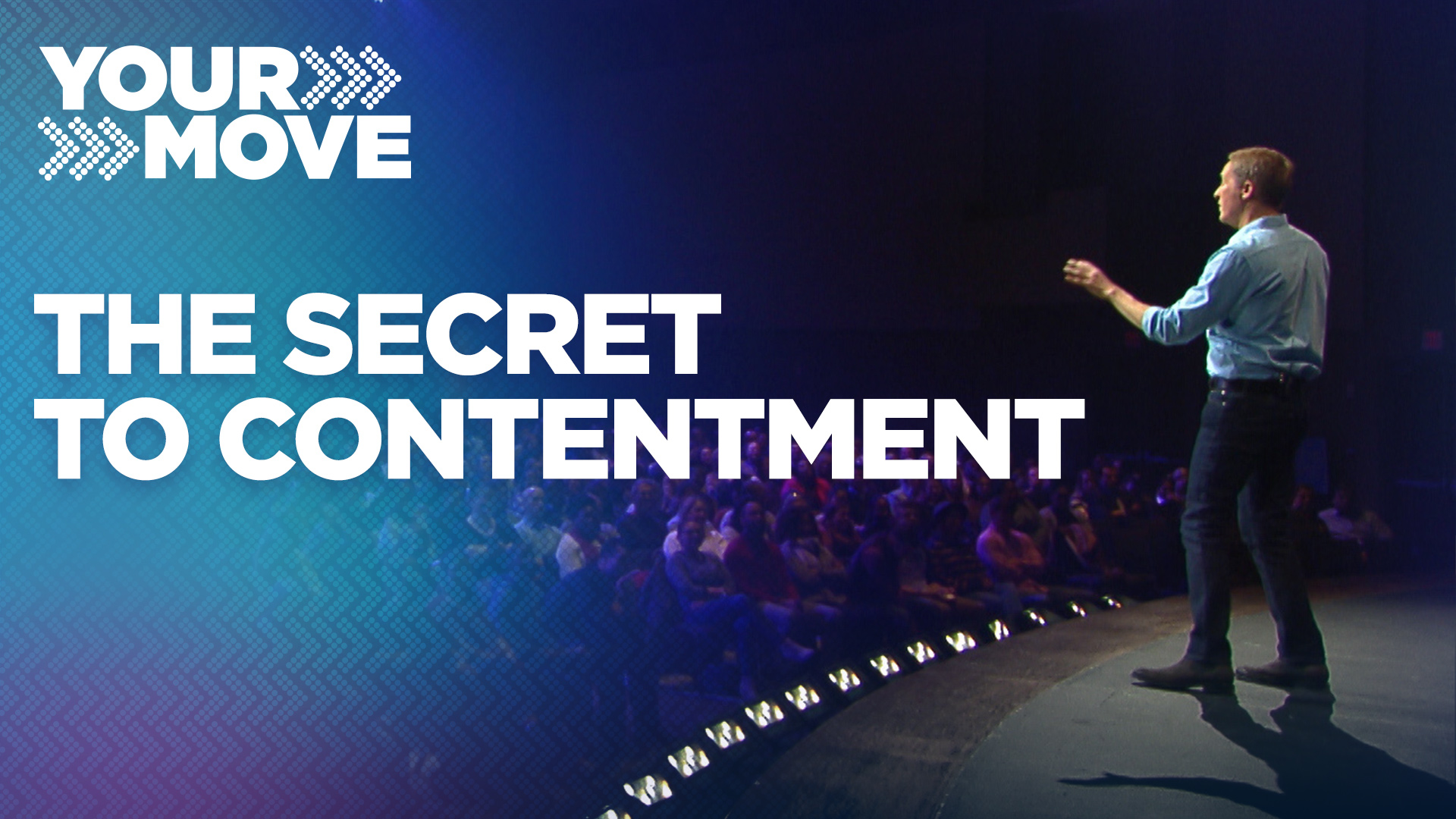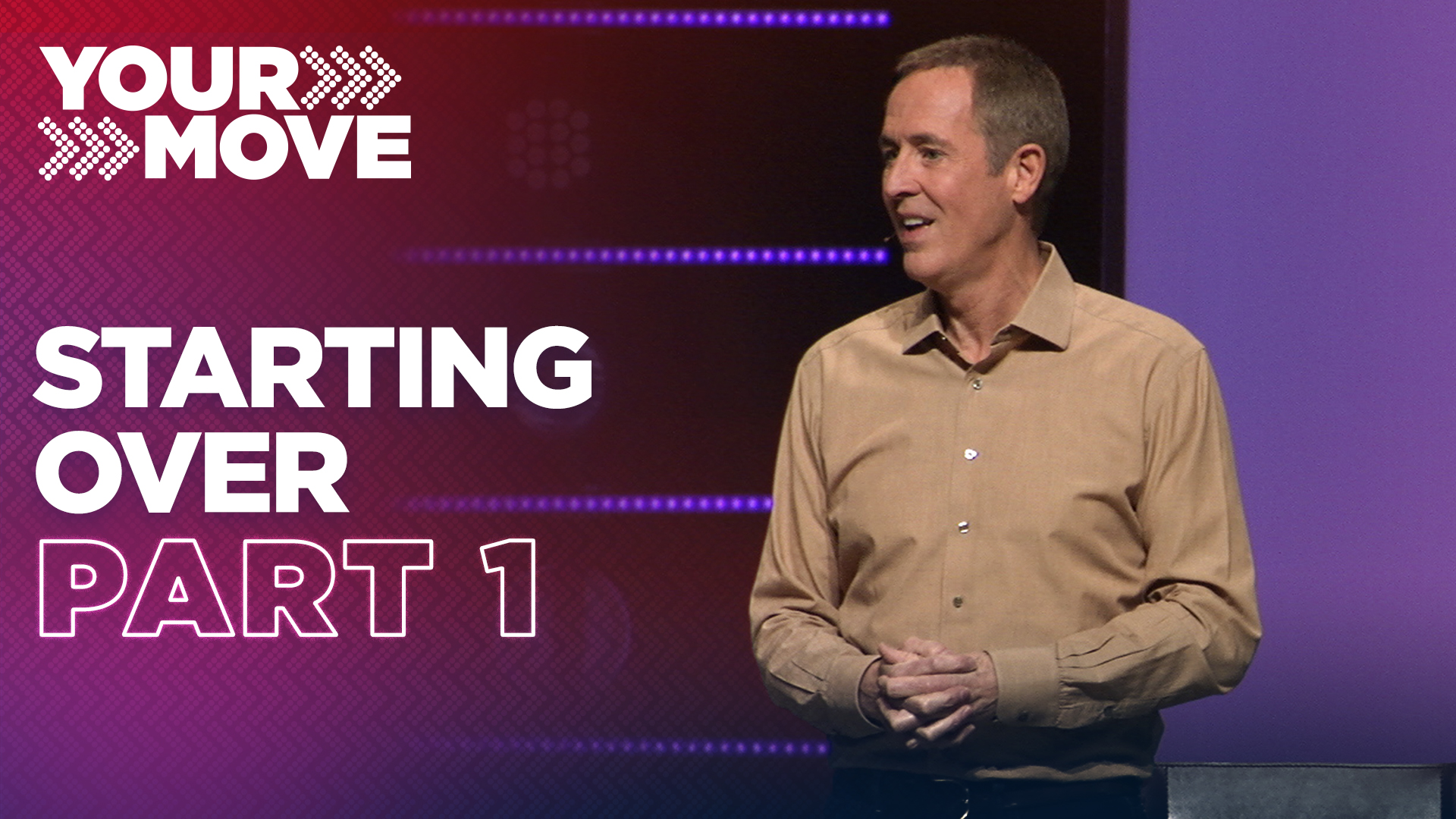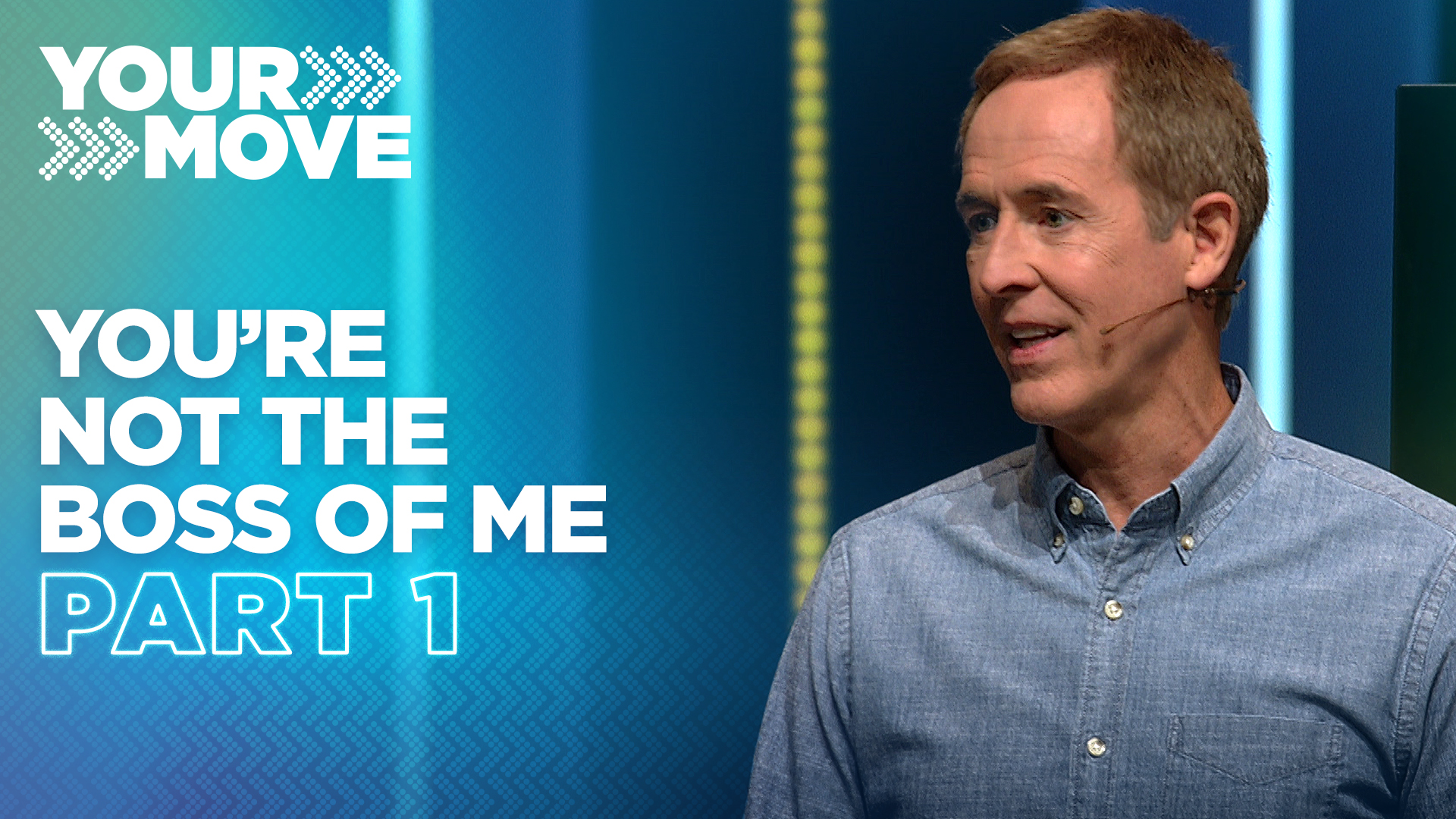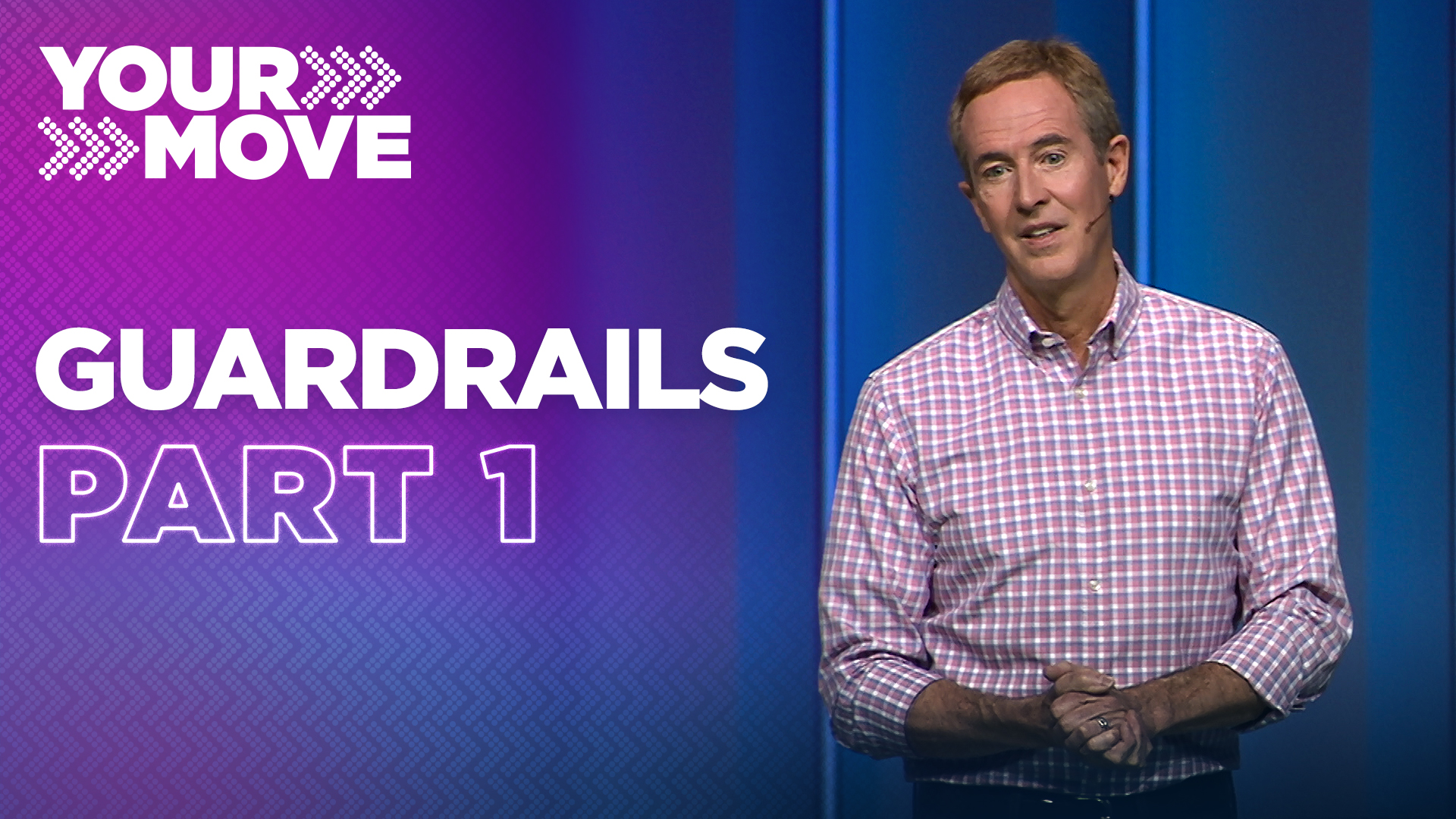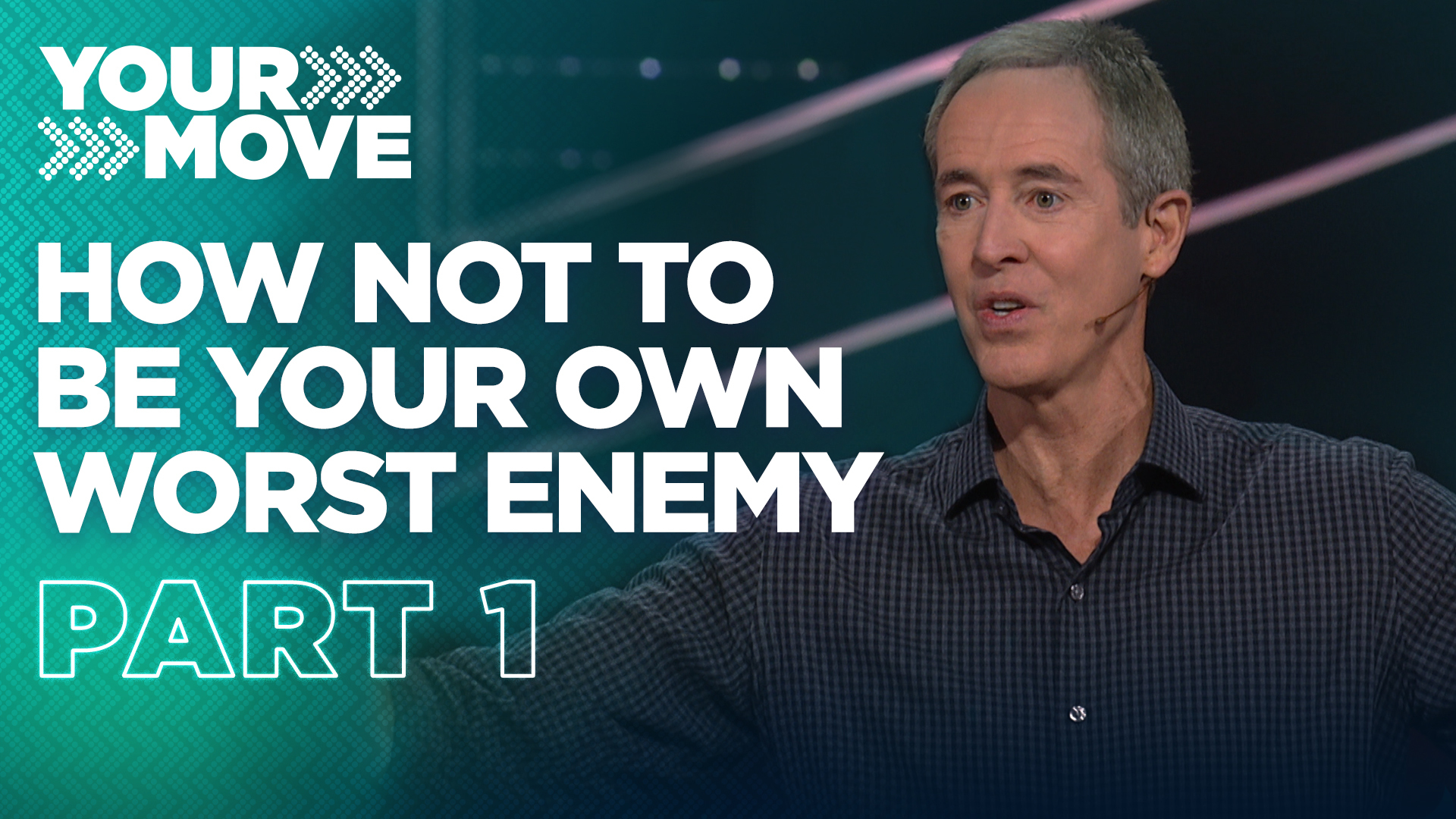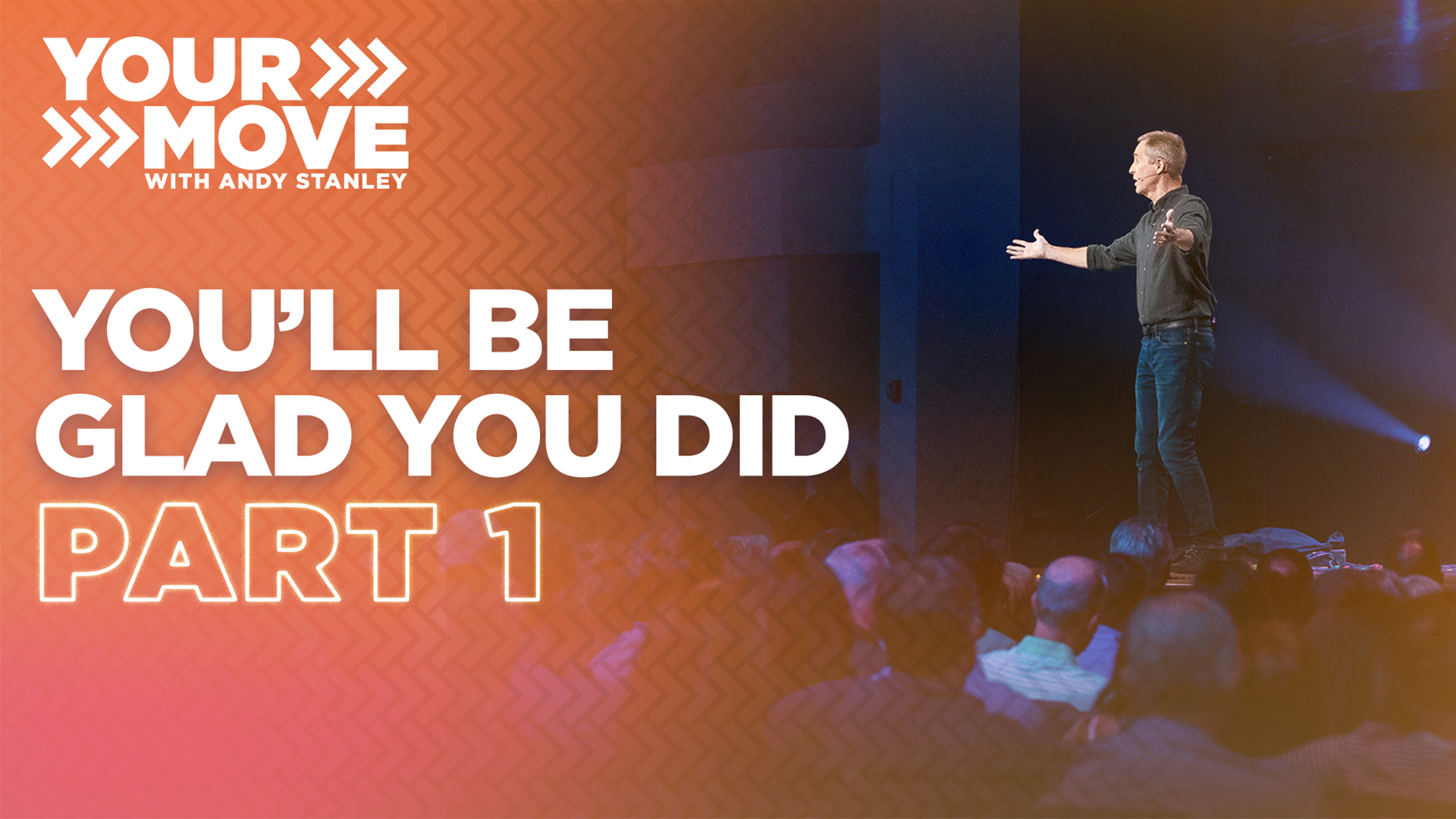Every decision we make becomes a permanent part of the story of our lives. But how do we keep that in mind when our emotions threaten to get the best of us?
- Do you prefer to think about the future in the shortterm or longterm? Explain.
- Have emotions ever fueled a decision you later regretted? What do you see now that you couldn’t see in the moment?
- Focalism is when we hyper-focus on a specific desire. Has focalism ever influenced a decision you’ve made? What happened?
- What makes it difficult for us to connect our individual decisions with the big-picture story of our lives?
- Consider a decision you’re facing right now. How might it help to ask yourself, “What story do I want to tell?”
NOTE: The following content is a raw transcript and has not been edited for grammar, punctuation, or word usage.
So, welcome to Your Move. Today we are continuing our discussion on the subject of decision-making. After all, life is all about the decisions that we make, right? In fact, you are where you are for the most part because of decisions you’ve made. My hunch is your greatest regrets are connected to decisions you’ve made as well. In fact, we can all think of a few decisions we would like to go back and un-make. Now, complicating all of this is the fact that life’s big decisions are never made in emotionally neutral environments, are they? In fact, it’s often our emotions that get us in trouble when it comes to the decisions that we’ve made. For example, have you ever made a really bad relationship decision? I bet you have. At the time though, it seemed right, didn’t it? He seemed, she seemed right. You were in love or you were in lust or you were in something and whatever it was you were in, it was emotional, wasn’t it? Your parents or maybe a best friend tried to warn you, but to no avail, you were sure he was Mr. Right, you were sure she was Ms. Right. And now, looking back you think to yourself, “What was I thinking? I should have known better. I should have listened.”
How about this one, have you ever made a really bad purchasing decision? Of course you have. [chuckle] We all have. But once you got your heart set on it, whatever it was, it was over. And no, you really couldn’t or shouldn’t afford it, but you just figured out how to get it anyway. We all do this. And looking back, you just shake your head and you wonder, what in the world were you thinking? And yeah, it’s fun to drive, but the payments are killing you. And yeah, it’s fun to watch, but you knew better than to finance a television. Then there are those decisions that we never imagined we’d ever have to make, those unanticipated decisions. This happens all the time, right? Have you ever had a friend that was bad for you, maybe a toxic relationship. You liked them, but then you were becoming more and more like them, and somebody comes along and says, “Hey, I don’t think she’s good for you, I don’t think he’s good for you,” and now you have a decision to make, a decision you don’t really wanna make.
And then there’s this. We never really know what hangs in the balance of the decisions we’re making until later, do we? Right? Because we don’t know the future. In some cases, well, in some cases it takes a lifetime for the outcome of a decision to play out. In some cases, several lifetimes. Think about the ways that your life has been shaped by the decisions your parents or even your grandparents made. Think about how different your life might have been if your parents hadn’t split up. Think about how different your life would have been if they had. The point is this, we never know what or who hangs in the balance of the decisions we are making right now. But what we do know is this, private decisions have public implications. Your private decisions will not stay [chuckle] private and your personal decisions will impact some other persons. So, in these four episodes, in these four episodes we are discussing four questions that will empower you to make better decisions and live with fewer regrets. Last time I gave you the first question, I asked you to ask a question, and I warned you, I said, “This may be the most difficult question of the four to ask.” And the question is this, “Am I being honest with myself?”
And then I added a word, remember? “Am I being honest with myself really?” That’s an important question, because when it comes to selling ourselves on bad ideas we are all professional sales people, aren’t we? When it comes to convincing ourselves to do the wrong thing, we’re experts. You don’t have to think back very far to know that to be the case, right? I mean, remember talking yourself out of exercising, remember the last time you talked to yourself into dessert? I rest my case. You’re good, at least you’re good at that, right? We all are. Consequently, we need to get in the habit of asking ourselves this first important question, “Am I being honest with myself, am I being honest with myself, really?” And that brings us to the second question we should ask when making any kind of decision. And here it is, and this may take you by surprise. What story, what story do I wanna tell? What story do I wanna tell? What story do you wanna tell? Now, I want you to think about something that perhaps has never crossed your mind before. Every decision you make, every decision you make becomes a permanent part of the story, the story of your life.
Every decision, just think about it, every decision that you make has an outcome, an outcome, a consequence, a result. It may be good, it may be bad, it may be desirable, it may be undesirable, it may be expected, it may be unexpected, whatever the case, that outcome becomes a permanent part of the story of your life. You went out with him, he was a jerk. As it turns out, part of your story is, you wasted a year or two [chuckle] dating a jerk. Your boss asked you to lie to a client, you lied, the client called you out, you lost your job, and now part of your story is, you lost your job because you lied. Your friends wanted to go out, you had an exam to study for, you said no to your friends, you aced the exam, and now you have a diploma to show for it. See that’s the thing, every decision, every decision and the outcome of that decision becomes a permanent part of our story, which means that decision by decision… Think about it. Decision by decision, you are writing the story of your life. That’s why when you’re making a decision of any magnitude you’ve gotta stop and look ahead and ask, what story do I eventually want to tell? Again, think about it.
The decisions you are in the middle of making right now, the decisions that you are in the middle of making right now are going to be nothing more than a story that you tell some day. So here’s the question, what story do you wanna tell? What story do you wanna tell? Chances are, you’ve really never thought of it this way, you’ve never thought of your life as a story, a story you’re writing, but it is. Perhaps you lost your job recently, perhaps you’re surviving this season without a job, and one day this will be nothing more than a story that you tell. What story do you wanna tell? Do you wanna tell this story? I lost my job, I was so depressed, I started drinking, I racked up a ton of debt. I lost the respect of my wife and my kids. I mean, that’s not a good story. What about this? You’re dating someone and things are really going well, but then you met somebody else at the office and yeah, she’s married, but you just kinda find yourself drifting in her direction and she seems to be gravitating in your direction as well. Next thing you know, you’re on a business trip, you’re on a business trip together and she’s made it obvious that if you’re willing, she’s willing.
Sounds exciting. But your decision becomes a permanent part of your story. What story do you wanna tell? I got involved with a woman at work, busted up her marriage, now her kids are ping ponging back and forth on the weekends. Is that really the story you wanna tell? I don’t think so. I certainly hope not. Now, I know we’ve never met, but here’s something I know about you. You would like to be able to tell your entire story without skipping any chapters and without lying about the details, right? I mean, some day wouldn’t you like to be able to sit down with your kids, or maybe even your grandkids and tell your entire story? Wouldn’t you like to be the hero in your own story? I think we all want that. And going forward, you can have that, but it will require you to stop mid-decision and ask, “What story do I want to tell?” or “Which of the available options do I want as a part of my story?” Now, one of the reasons that we don’t think about story when we’re making a decision is that we get distracted by the pressure and the emotions we feel in the moment, right? I mean, emotion, emotion is like a fog. It causes us to lose sight of the broader context. It causes us to lose sight of the fact that we’re writing a story and you know how this works.
You’re up against a deadline, you gotta decide, you gotta decide soon. If you don’t marry me, I’m leaving. [chuckle] And nobody wants to be left, right? If you don’t make your quota, you’re fired and nobody wants to be fired. When you’re forced to make a decision under pressure, it’s hard to think about tomorrow, much less your story, you’ve gotta get through today. So whether it’s love or lust or greed or jealousy, or financial pressure, all of this complicates the decision-making process and all of this focuses our attention on the immediate rather than the ultimate. We’re left thinking in terms of our options, our choices, but not our story. Now, here’s another angle. Isn’t it true… Think about this, isn’t it true that our worst decisions were fueled by something with strong, and here’s our word, strong emotional appeal? You know, the that weekend, that first marriage, that purchase, that lease, it was so appealing you bought it, [chuckle] it was so appealing you ate it, [chuckle] it was so appealing you dated it, then you moved in with it, it was so appealing you took it, you smoked it, I could go on and on and on.
The reason we have regrets, the reason we look back and wonder what was I thinking is there was something that had strong emotional appeal. If you’re in retail sales, you know how this works, you know about the worst thing you can do is let a potential customer leave the showroom or leave the store without making a sale. Why? Because once they walk out, what happens, the emotional attachment they felt towards your product begins to lessen. They gain perspective [chuckle] and they’re far less likely to make a purchase. Experts tell us, experts tell us that once our appetites are engaged in the decision-making process, we fall victim to a cognitive bias labeled focal-ism. If you’ve ever been in love, you have been a victim of focalism. This is why guys, the first time you fell in love, all you could see was her, remember? Everything else seemed to fade into the background. When this occurs, everything except what we’re fixated on gets blurred by comparison. Think about that car you want, isn’t it true? Once you decide what kinda car you want, you see it everywhere, we hyper-focus. Again, we get locked into options. The big picture, our story is the furthest thing from our minds.
In emotionally charged decision-making environments we think in terms of choices, not story. So, here’s a tip, strong emotional appeal, even though it’s part of the goodness of life, is actually a red flag, not a green light. When something is emotionally appealing instead of leaning in, we should actually step back. We should step back and say, “This may be a great thing. She may be the one, he may be the one, this may be the job, this may be a good investment, but I’m gonna be wise and I’m gonna pause. I’m not going to be a victim of another emotionally charged [chuckle] environment. I’m gonna get my bearings before I decide.” And that’s what makes this question so extraordinarily powerful. It draws us out of the immediate and focuses us on the eventual, it empowers us to put the decision-making process within the broader context of the story of our lives. Our story is future tense. So, every decision we make should be made with this question in mind, what story do I wanna tell? What story do I want to tell?
Now obviously, we’re not the first generation to wrestle with this, right? In fact, there’s a story in the Old Testament that serves as a perfect illustration of this principle, better yet, the primary character, a teenage Hebrew boy actually models a specific application of this idea that’s extremely helpful. But first, a little context. Around 1850 BC, a teenager named Joseph, one of 12 sons found himself in a very tough spot. His father Jacob loved him more than he loved all of his brothers and why did he love him most? Well, because Joseph was the son of Jacob’s favorite wife. Note to self, it’s best not to have a favorite wife. Anyway, one day, the older brothers, the sons of Jacob’s second favorite wife, see Joseph headed in their direction and they decide to act on what they had been feeling for a very long time. They decide to kill Joseph. But as he got closer apparently they lost their nerve and they decide instead to throw him into an empty well, until they can get up the nerve to kill him. [chuckle] And you thought your older siblings were merciless.
Yeah, well anyway, you may remember this story from childhood, if so, you’ll remember that Joseph gets a break sort of, instead of killing him, Joseph’s brothers decide to sell him, way more profitable and a bit more merciful. So, they sell him to slave traders and they tell his parents that he was killed by a wild animal. Now, this breaks Joseph’s father’s heart, because of course, Joseph was his father’s favorite son. But now, but now Joseph’s brothers have a secret they’re forced to live with for the rest of their lives. This one decision, don’t miss this, this one decision made them liars for life. Now, back to our big idea for just a moment. Imagine, imagine if we could have dropped in on Joseph’s brothers as they were contemplating how to channel their intense jealousy toward their brother, and what if we’d asked them, “Hey guys, what story do you wanna tell? Do you realize that how you choose to treat your younger brother is eventually going to be nothing more than a story that you tell or perhaps a secret you’re forced to keep? But it will be a permanent part of your story.” As the story goes, Joseph ends up on an auction block in Egypt, where he’s purchased by a gentleman named Potiphar, who just happens to be the captain of Pharaoh’s palace guard.
Well, Joseph decides to do his best and to serve Potiphar’s household with everything he’s got. As if it were his own household. Before long, Potiphar notices what a hard worker Joseph is and he gives him more and more responsibility. In fact, the author of this story describes it like this, he says, so Potiphar actually left everything he had in Joseph’s care. With Joseph in charge, he did not concern himself with anything except for the food that he ate. So eventually Joseph ends up running Potiphar’s entire household. Now, that is a story we’re telling, isn’t it? I was kidnapped, I was sold into slavery, I was a victim, but I decided not to play the victim, I decided to trust God, do my best with the opportunities that came my way. That was the story Joseph opted for, and for a while it worked. But then his story intersected with someone else’s story. In spite of his diligence, in spite of this discipline, in fact, because of his diligence, because of his discipline, he finds himself in a no-win situation, in which he’s forced to make yet another difficult decision.
This time, he’s [chuckle] faced with two options, neither of which would lead to a good outcome. Here’s what happens next. Now, Joseph was well-built and handsome, and we can see it coming, can’t we? And after a while, after a while, his master’s wife took notice of Joseph and said, “Come to bed with me, sleep with me.” And think about this, he’s about 19 or 20 years old. He’s far, far, far from home and this isn’t just a moral issue for him, this is a life and death issue. He could lose his life, either way he chose and the text says, believe it or not, that Joseph, this teenage Hebrew boy far from home with no God, who’s done anything for him lately, the text tells us that Joseph actually refused her offer. And then Joseph employs a powerful technique, this is so amazing, this is something we should all do. Joseph actually rehearses his story out loud as the context for the decision he just made. He doesn’t allow this unfortunate situation to overshadow or cause him to lose sight of the broader story of his life, which is so difficult to do in a circumstance like this. Instead, he views this decision within the broader context of his entire story.
This is such a powerful idea and not only does he do this, he does this out loud with Potiphar’s wife standing right there. So, allow me to paraphrase, if I might. Mrs. Potiphar, Mrs. Potiphar, he says, I came to this land as a slave. I had no rights, and I had no future. Your husband purchased me. He treated me with kindness, I did my best to serve him and you and the family. I’ve worked hard, I’ve done everything I’ve been required to do. With God’s help, I’ve worked my way to the point where your husband trusts me. Look, he’s put me in charge of his entire household. And then he says this, and I quote, “With me in charge,” he told her, “My master does not concern himself with anything in the house. Everything he owns, he has entrusted to my care. No one is greater in this house than I am. My master has withheld nothing for me [chuckle] except you.” And then here’s a little dig, because you are his wife. Implication, Mrs. Potiphar that’s your story. You really need to think about this. Do you really want affair with a Hebrew slave on your resume? Are you sure you want that as part of your story? And then he asked an incredible question?
In light of all that’s happened, in light of your husband’s confidence in me and God’s mercy toward me, how then, how then could I do such a wicked thing and sin against God? This is amazing. In other words, why would I want to add adultery to what’s turning out to be an amazing story with an amazing ending, an ending I would have never dreamed possible. Think about it, Mrs. Potiphar, which of these two should I tell? Which is the better story to tell? Story number one, your husband gave me an opportunity, I never dreamed would come my way, so I was faithful to him, I was faithful to God who’s been watching over me. Or story number two, [chuckle] your husband gave me an opportunity I never dreamed would come my way, so I took advantage of his trust and had an affair with his wife, dishonoring both him and God. Which is the better story? The narrative continues. And though she spoke to Joseph day after day he refused to go to bed with her, or even be with her.
Now, Joseph was smart enough to know that this decision whichever way he went, was gonna cost him, but whichever way he went, it would be a permanent part of his story, so he chose not to give in to her request. But this was humiliating to Potiphar’s wife. I imagine this is the first time she had been told, no in a very long time. So she accuses Joseph of actually trying to rape her and her husband Potiphar had no choice but to respond to his wife’s accusation by punishing Joseph, that he didn’t have Joseph executed means that he probably didn’t believe his wife’s story. Again, this had probably happened before. So the text tells us that he had Joseph thrown into prison, but not just any prison, he had Joseph thrown into the prison where political prisoners were kept. In spite of this setback, the writer tells us that the Lord was with Joseph, which… And my way of thinking is a bit strange. Because if the Lord is with Joseph, it would seem like the Lord would have kept all of this from happening to Joseph in the first place, right? I mean, if the Lord was with Joseph, he never would have been kidnapped by his brothers. If the Lord was with Joseph, he never would have been thrown into the pit.
If the Lord was with Joseph, he would have never been sold as a slave. But then, Joseph’s story wasn’t over. And you know what, regardless of what you’re going through right now, your story isn’t over either. Now, while in prison Joseph does the same thing he did when he was in Potiphar’s [chuckle] household. He does his best and over time he wins the favor of the prison warden. Which when you think about it, that’s not really something you want on your resume, is it? Hey, at least the prison warden liked me, right? Anyway, before long, Joseph is pretty much… Was pretty much running the place and after being there for about two years, a couple of other prisoners become his friends, and they have dreams and Joseph correctly interprets their dreams. Both of these men had previously worked for Pharaoh. One is actually restored to his position as Pharaoh’s cupbearer, just as Joseph predicted, but the other is executed. Again, just as Joseph predicted. And then, two more years go by, two more long years. Joseph no doubt had resigned himself to the idea that finding favor in the eyes of the prison warden was gonna be as good as it gets. But then, everything changed.
Pharaoh had a dream, Pharaoh had a dream that he believed had significance for the nation of Egypt. But none of his magicians could interpret the dream and then his cup-bearer remembered the Hebrew boy he’d met in prison. The one who could interpret dreams, he tells Pharaoh all about Joseph, and Joseph is brought before Pharaoh, can you imagine this? He interprets Pharaoh’s dream and Pharaoh sees in Joseph, a man, he can trust. Potiphar would vouch for him, the prison warden would vouch for him as well. His reputation was spotless, his track record was impeccable. He had nothing to hide, nothing to be ashamed of, and in the end, Pharaoh, get this, Pharaoh makes Joseph the prime minister of Egypt, and his primary responsibility was storing enough grain to sustain the nation of Egypt through the famine predicted in Pharaoh’s dream. Once again, Joseph fully embraced this opportunity and seven years later, a famine devastated that part of the world, nothing would grow, people in the surrounding regions were starving to death, but in Egypt, thanks to Joseph, his diligence, his discipline, there was a surplus of grain.
Now, this is where the story takes a really strange twist. Eventually, Joseph’s brothers, remember those guys, they had to come to Egypt to buy grain. [chuckle] When they recognized Joseph. Well, when they recognized Joseph, they wetted themselves, they were terrified. They were terrified because they assumed Joseph would do unto them as they had done unto him, perhaps worse. But Joseph wasn’t anything like his brothers. Joseph had decided many years earlier to live out a story worth telling. He didn’t want revenge to be part of that story. So, in addition to rescuing the nation from the devastating famine, Joseph actually rescued his brothers and their families. He moved all of them to Egypt where they settled permanently as guests and relatives of the Prime Minister, Joseph. Now, before we leave this story, I want you to think for a moment about the contrast between Joseph and his brothers. His brothers who had a story they spent their lives hiding. A story that actually made them liars for life, as year after year they continued to deceive their father, deceive their mother regarding Joseph’s fate.
Joseph on the other hand had a story he was proud to tell, and it was a story he wrote one decision at a time. Little did he know, think about this, little did he know that thousands [chuckle] of years later, we would still be telling his story. Now, here’s the thing I don’t want you to forget. Like Joseph, like his brothers, you, you are writing your story one decision at a time, think about that. You’re writing the story that is your life every day one decision at a time. Just like Joseph, just like his brothers, you’re writing the story that is your life every single day. And if you don’t take anything else away from Joseph’s story, I hope you’ll take this away. Please, don’t ever make a decision that will make you a liar for life. Long after whatever you gained is gone, you will be left with your lie, you will be left with a story you will not be proud to tell. Again, what story do you wanna tell? I have a friend who a few years ago went through an extremely painful expensive and drawn out divorce proceeding. His wife was unfaithful, she pretty much abandoned him, and the two kids, she moved in with her boyfriend, she didn’t even ask for custody.
For her, it was always about the money, and it seemed that nothing was beneath her when it came to getting what she wanted. And in the end, again, it was always about the money. Jimmy was so hurt, but of course, he was also so angry as he watched his wife leverage the Kids, lie about her affair, and eat up tens of thousands of dollars and unnecessary court cost and attorney’s fees. Early on, and what would turn out to be a two-year court battle, Jimmy and I were having dinner, and I told him basically what I’ve told you, I said, “Jimmy believe it or not, believe it or not, this entire ordeal will be nothing more than a story you tell some day. One day, it will be in the rear-view mirror of your life, it’ll be just one more story, a painful story, but just a story.” And then I asked him to do what I’m asking you to do. I said, “Jimmy, do you wanna tell?” What story do you wanna tell your kids someday when they’re old enough to begin asking the tough questions, when they wanna know the details about what happened between you and their mom? I warned him, I said, you’re gonna be tempted to be critical of your wife, just like she’s critical of you. You’re gonna be tempted to look for ways to hurt her, the ways that she’s hurt you.
You’ve just gotta remember that every decision you make becomes a permanent part of your story. I’ll never forget this. He teared up, I teared up. And here’s what he said, he said, “Andy, I wanna write a good story. I wanna write a story worth telling.” And every few weeks for months, he would call me or leave me a voice mail or a text and here’s what he would say. “Hey Andy, I can still tell my whole story.” His ordeal ended after about four years. But if he were here with me today, he would look you in the eye and I know what he would say, he would say, regardless of what you’re going through, one day it will simply be a story that you tell. So, write a story you want to tell. And remember, you do that one decision at a time. Now, you’ve lived long enough to have a few chapters you wish you could erase, right? You have a few stories you wish you could re-write? We all do. We call those regrets. But chances are, the decisions that led to your greatest regrets, think about it, they could have been avoided if you had stopped and asked yourself our question, what story, what story do I eventually want to tell? You write the story of your life one decision at a time.
So come on, write a good one. Write a story worth telling. Write a story you’re proud to tell. Make it a story you’ll be proud to tell your children, maybe your grandchildren someday. And if you’re in the middle of making a decision right now, let me ask you, which of the available options, which of the available options do you want as a permanent part of the story of your life? What story do you want to tell?

